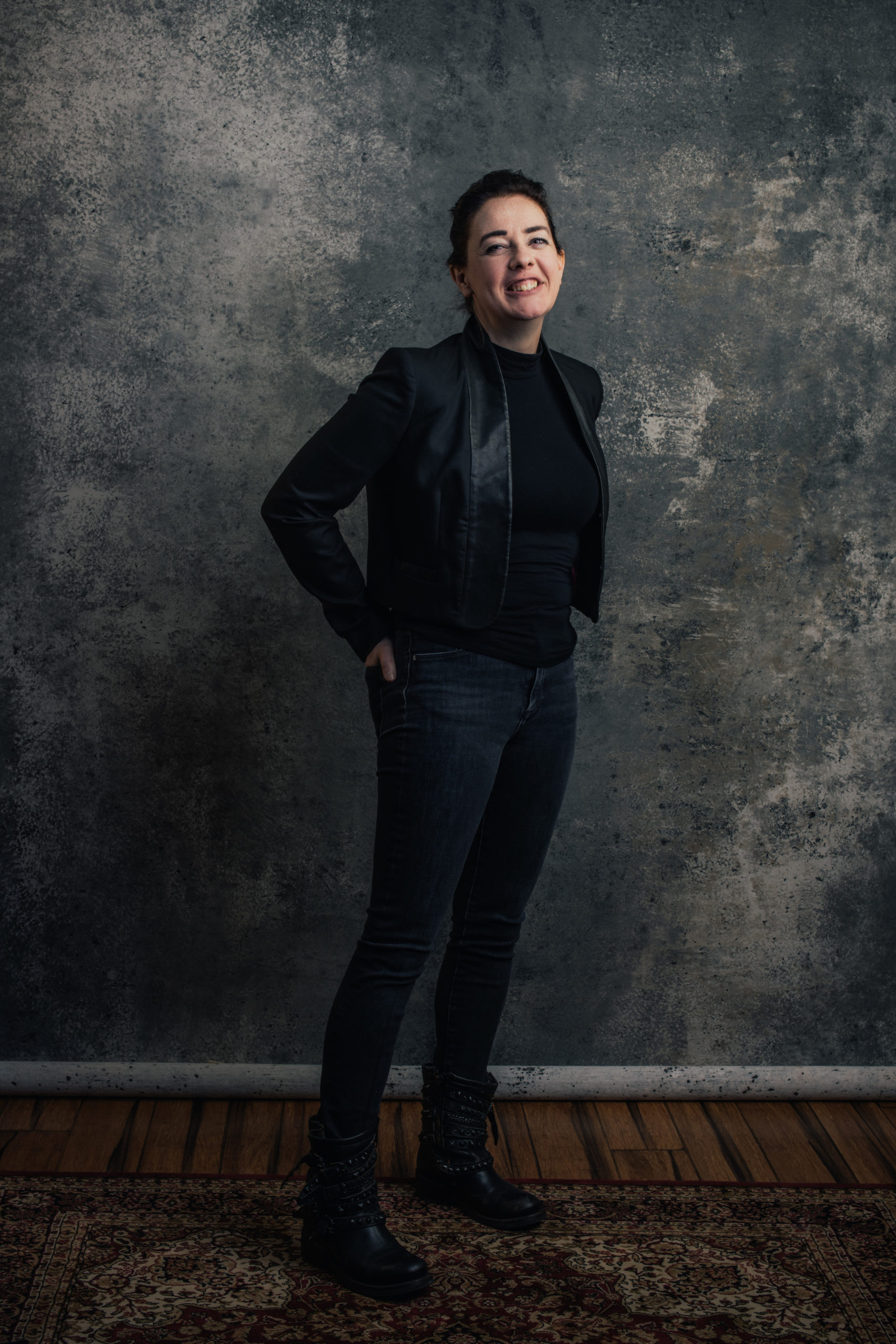q&a
Maggie Stiefvater’s Superpower

Photo by Stephen Voss.
Maggie Stiefvater is one of the best young adult authors working today. Having written 30 novels by the time she was 18, her craft has ripened over time, giving us some of the most complex work being done in the genre. A master of mood, Stiefvater brings a rare lyricism to her work that deepens her graceful handling of difficult narratives, both magical and common. Her four-book series The Raven Cycle dealt with themes of class, abuse, and mortality, using magic as a means to explore these issues, not wish them away. Now her sequel series, The Dreamer Trilogy, pushes against the implicit message that magic is something that expires at adulthood, pushing her protagonists to develop their magic into maturity. Here, she discusses her writing tricks, the building blocks of YA fiction, and the importance of holding on to magic.
———
SHANTI ESCALANTE-DE MATTEI: Could you describe your ideal writing atmosphere?
MAGGIE STIEFVATER: I used to say that I like to work in my office where I could have my music on and have my cup of tea. I know now that that’s completely incorrect. I’ve had to write in airports and hotels, I’ve written entire chapters in parking lots of various grocery stores while on tour or in hospital waiting rooms. Now I know that all I really need to do to be prepared to write is to have music in my ears, reminding me of the mood. Knowing the mood I’m trying to put the reader in is the most important part. If I can remember that, I’m good.
ESCALANTE-DE MATTEI: Do you keep a notebook or journal?
STIEFVATER: I do. At the beginning and end of every single book, I still pull out a journal or a piece of scrap paper and I write down my brainstorming thoughts.
ESCALANTE-DE MATTEI: Do you have a favorite quote that you tend to keep near you?
STIEFVATER: I normally have a Post-It note on my computer that has a tone statement for the book or the series that I’m working on. There’s one stuck on my computer since I started writing The Dreamer Trilogy and it says, “What do they want more?” For The Raven Cycle the note reminded me that the worst thing that would happen to any of them was that they would stop being friends.
ESCALANTE-DE MATTEI: Who’s writing do you always return to?
STIEFVATER: I have an entire shelf of favorites next to me. One of my things that I love to do when I’m stuck is I love to pull out 10 of them. I like to open up random chapters and look at the way that people start to tell a story. I really do love Diana Wynne Jones. She was probably one of my first favorite authors.
ESCALANTE-DE MATTEI: What books did you read as a kid or teen?
STIEFVATER: I was a library brat, and a Navy brat in general. I moved 18 times before I was 18 and so every time I went to a new city, my mom would get me a library card, which means I almost never read anything that was brand new. Instead, I read what was prevalent on library shelves, which means my tastes tended to be more eclectic and old-fashioned. I already mentioned Diana Wynne Jones. I think she was probably the most influential writer [in my life]. Not only did I love her combination of magic and humor, but I still remember the summer that I opened up her book and there was that page in the front that said, “Also by the author.” There was a huge long list of titles and I thought to myself, all of a sudden, “This is her job. This is what she does. You could be a writer.” I wanted to have that.
Another author that was hugely influential to me at that time was Susan Cooper, who wrote the Dark Is Rising series. Again it was that combination of writing the mundane and magical that you can see in my work you can today.
ESCALANTE-DE MATTEI: How many drafts do you typically write?
STIEFVATER: Do I think of them in terms of drafts? I don’t know. Some parts of my manuscript I’ll write and it just ends up that way in the book. Other chapters will be redone 15 or 20 times. The general scheme of having a rushed, rough, trash draft, and then having a more beautiful draft, and then having a line edit draft is true for me.
ESCALANTE-DE MATTEI: Do you consider writing to be a spiritual practice?
STIEFVATER: I do. I think that if I started to think of it as just work it wouldn’t move the reader in the same way. I’ve also done many different kinds of writing, I was a car journalist for a while, I’ve written craft pieces. Writing that [type of work] was important and obviously I was respecting my reader but it didn’t dig deep. I feel like fiction, for me, definitely digs deep. It has to.
ESCALANTE-DE MATTEI: Which writer would you choose to have dinner with living or dead?
STIEFVATER: This answer would change from day to day but I’m going to go with Susanna Clarke for today. She wrote Jonathan Strange and Mr Norrell and she also wrote the novel that was my favorite novel of the past five years, Piranesi. It would be cool to talk magic with her.
ESCALANTE-DE MATTEI: Do you think great writing can save the world?
STIEFVATER: I think great ideas can save the world and beautiful writing is a way to convey great ideas.
ESCALANTE-DE MATTEI: Has having children affected the way that you write?
STIEFVATER: I don’t know that it has, except I did have a very difficult parenting moment a couple of years ago. We’re very strict about our children’s bedtime, especially back then, and I realized that my daughter’s light was on and it was one o’clock in the morning. I went up there and asked her what she was doing. She had a book hidden under her pillow, and when she pulled it out, it was Shiver, which, of course, I wrote. I had to ask myself, “Do I tell her to go to sleep or allow her to keep reading my book?” You have to put aside your ego when parenting.
ESCALANTE-DE MATTEI: What makes YA different than “adult” literature? Is it the thematic concerns? The age of the characters?
STIEFVATER: To me, the major difference between a YA novel and an adult novel is the size of the protagonist’s past and future. The more a protagonist is carrying forward from the past, the more adult the story tends to feel. Characters moving forward without a lot of background to weigh them down or inform them? That tends to feel YA, no matter how old they are. That said, YA is a young and changing category. It’s transformed a lot since it became mainstream a few decades ago, and I’m sure it’ll keep shifting to keep its footing in a changing literary world.
ESCALANTE-DE MATTEI: When I was reading YA, especially when I was younger, there was this immense pain that followed ending any of these books, especially those like His Dark Materials or The Underground Chronicles, where the characters make the decision to seal off the portal to the magic world and and accept living a mundane life ,or one that isn’t full of magic. Is that pain something that you also feel as an author? Did this pain encourage you to create this sequel series?
STIEFVATER: That’s true. Every single long-running fantasy story has that moment at the end when magic goes away, the elves sail off to the Western world, the portal is closed, magic is done. Now you put away childish things, like the Bible says, and you become an adult. I disagree so much with this as a thesis statement for how to live your life. It promotes a kind of ageism and makes you think that adults are fundamentally different from teens. It makes you regret the idea of growing up. It means you always look back and think about this magical time in your youth. And it means you’re not as forward-thinking as you should be.
I don’t want to say too much about it because of course I am wrapping up this spinoff series which is very much about what happens when you become an adult and you have magic at your disposal. Looking at the end of this trilogy, and knowing that all fantasy is a metaphor, I’m very mindful of thinking about what it is that I’m telling people. I believe the rule of magic and power is in the world as an adult. And so again, not to be too spoiler-y, but I don’t agree with the concept that the portal is closed and the magic is over as being the solution to the fact that you’ve introduced magic into your narrative.
ESCALANTE-DE MATTEI: And this issue pre-dates of fantasy or YA, the concept of tucking away magic for younger readers and foreclosing that for adults. I was reading Anne Carson’s translation of Euripides’ tragedies. She has this essay on Herakles where she writes, “Herakles has reached the boundary of his own myth. He has come to the end of his interestingness. Now that he’s finished harrowing hell will he settle back on the recliner and watch TV for the rest of time?”
STIEFVATER: Right. But that’s so depressing to me. It’s the question that gets asked again and again, and it seems to be answered the same way again and again. I’m not sure that folks are happy with that answer anymore. I was reading a piece today in Scientific American that was talking about how statistically humans have really won the lotto in that we have the benefit of only being a newborn baby for the first 24 hours of our life rather than our entire life being 24 hours. This means that we see the world so differently.
I feel like as long as you explore that concept again and again that we are the mentors, we are the ends, if you start looking at that backwards and forwards, it means that you have room forever to talk about magic. Just putting it away or sending it off to a tragic death or sealing it away or destroying Narnia’s doorway–we have more interesting answers to that. When you’re a child, you’re learning how to use this magic and experience it. What do you do with it when you’re an adult? You don’t just push it away. Instead, you learn a way to mentor the next generation or change the world with it. That’s our responsibility.
ESCALANTE-DE MATTEI: You mentioned going through a very painful period of an illness and it wasn’t allowing you to write at the time. What was it like losing your ability to write easily and what was it like being able to return to that?
STIEFVATER: Losing my superpowers? It felt in many ways like the doors being closed. I had hypopituitarism. I couldn’t find words, literally. I had no sense of time and that made narrative almost impossible. I would sit at the computer for 16 hours and sometimes I would return the next day, reread what I had done, and it wasn’t even an English. The sentences didn’t make any sense at all. I threw myself into finding out what these different diagnoses are, what the different conditions are and what kind of advances they’ve made on them. Eventually I found my way back to health. I’m grateful for it every single day. Everyday that I sit down and the words come easily is an amazing thing. It makes me want to do more with it than I did before. Before it was flippant, and now it’s like I’m playing for real.






